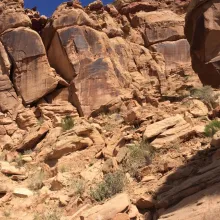Coral reefs, the nurseries of the seas, are vital to the fisheries that provide food for millions of people. Mangrove forests also benefit people: they protect coastal communities from increasingly severe storm surges and help to mitigate climate change by absorbing huge amounts of carbon dioxide.
But large infrastructure projects that ignore these benefits threaten some of these vitally important ecosystems.
AIDA uses the law to protect coral reefs, mangroves and other wetlands. We have found that it’s not enough to fight at the local level, country by country. AIDA approaches defense at the ecosystem level, which is more effective. We engage in discussions with international authorities, bringing attention to the obligations that countries have to the world to preserve their marine and coastal environments.
"What you get with these international legal actions is a strategy that weaves together various aspects of the case: legal, political, scientific and media. So we make the issue relevant not only to local decision makers, but also to international authorities. Public support is generated and consulting or certified experts speak out about it, "said Sandra Moguel, AIDA legal advisor.
A prime example of this strategy for environmental protection is a case involving Mexico, a country rich in wetlands.
In May AIDA alerted the Secretariat of the Ramsar Convention, an intergovernmental treaty for the protection of wetlands, about the possible breach of Mexico’s international obligations. Mexico’s government is considering approval of the proposed Las Cruces Dam, a hydroelectric project in Nayarit, a state in the country’s northwest.
Among other damage, the project would alter the course of the San Pedro Mezquital River, which feeds Marismas Nacionales (National Wetlands), one of the most extensive mangrove systems in North America. National Wetlands are listed as wetlands of international importance under the Ramsar Convention.
In 2010, diplomats from the Ramsar Convention recommended that the Mexican government advocate sustainable use of the wetland while assessing the project’s feasibility. We have alerted the Ramsar Secretariat that their recommendations would be ignored if Mexico gives a green light to a project that would irreversibly damage National Wetlands, biodiversity, and the communities that depend on that environment. By drawing the attention of international bodies, AIDA strengthens the efforts of our local partner organizations.
AIDA has also employed this strategy to protect the unique Cabo Pulmo coral reef, in Baja California Sur. Since 2012, we have continually reminded the Mexican authorities that both the Ramsar Secretariat and the Unesco World Heritage Committee have asked them to consider the cumulative and indirect impacts of tourism projects proposed near the reef.
Our arguments were added to those presented by our partners in Mexico to prevent authorization of Cabo Dorado, a mega-resort that would involve building a new city near the reef. This project is the third that tourism developers have attempted to build next to Cabo Pulmo. Construction would surely be fatal to the reef.
In a victory that extends beyond Mexican borders, the government decided on May 29 to deny the environmental permit for Cabo Dorado.
With your help, we will continue to bring the voice of local communities to international forums. We will continue to add value and support their struggle to preserve marine and coastal environments that benefit us all.
Thanks!
Dena DeBry

Dena DeBry is a fine artist and web developer. She runs Buttonwillow Six, a small web development company based in Salt Lake City. To see more, visit http://www.buttonwillowsix.com.
